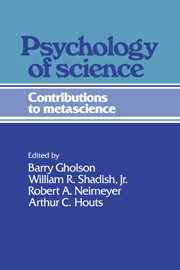Book contents
- Frontmatter
- Contents
- Preface
- Contributors
- 1 The psychology of science: An introduction
- Part I Historical issues in the psychology of science
- Part II The case for a psychology of science
- 4 The reflexivity problem in the psychology of science
- 5 Uneasy chapters in the relationship between psychology and epistemology
- 6 Participatory epistemology and psychology of science
- Part III Creativity and the psychology of science
- Part IV Cognition in the psychology of science
- Part V Social factors in the psychology of science
- Part VI Epilogue and Prologue
- Author index
- Subject index
4 - The reflexivity problem in the psychology of science
Published online by Cambridge University Press: 05 June 2012
- Frontmatter
- Contents
- Preface
- Contributors
- 1 The psychology of science: An introduction
- Part I Historical issues in the psychology of science
- Part II The case for a psychology of science
- 4 The reflexivity problem in the psychology of science
- 5 Uneasy chapters in the relationship between psychology and epistemology
- 6 Participatory epistemology and psychology of science
- Part III Creativity and the psychology of science
- Part IV Cognition in the psychology of science
- Part V Social factors in the psychology of science
- Part VI Epilogue and Prologue
- Author index
- Subject index
Summary
Reflexivity objections to the psychological study of science
A familiar philosopher's objection to the use of psychology to study science itself may be expressed as follows. Assume an initial picture of science as an activity in which theories are used to explain observations. Suppose now that we wish to investigate what counts as an explanation. We might proceed by gathering examples of scientific explanations. Suppose the first few examples we gather are theory T1 which explains observation O1, theory T2 which explains some other observation O2, theory T3 which explains observation O3, and so on. Each of these examples is now treated as an observation requiring explanation by a psychological theory. Let us label them as follows:
El: Tl scientifically explains O1,
E2: T2 scientifically explains O2,
E3: T3 scientifically explains O3,
etc.
Next we consider how well these examples are explained by various psychological theories. Call the first psychological theory we consider P1, and suppose it explains observations E1, E2,… etc. Then the structure of our investigation can be represented as follows:
P1 scientifically explains E1,
P1 scientifically explains E2,
P1 scientifically explains E3,
etc.
A difficulty arises here because E1, E2, E3… etc., are themselves scientific explanations. Is the middle term “scientifically explains” linking P1 with E1 to be understood in the same way as the scientific explanation recorded in E1? If the answer is affirmative, we have gone in a circle; that is, we have used the very same concept that was the object of our investigation in the investigation itself.
- Type
- Chapter
- Information
- Psychology of ScienceContributions to Metascience, pp. 92 - 114Publisher: Cambridge University PressPrint publication year: 1989
- 3
- Cited by



